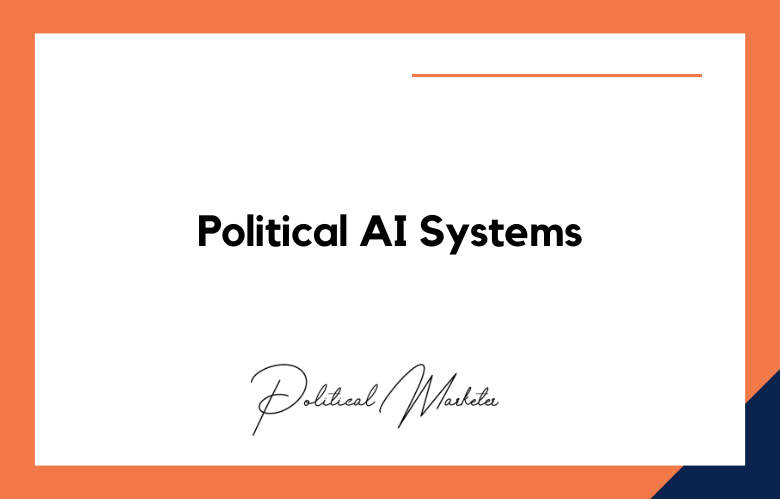The emergence of artificial intelligence has revolutionized various industries, and political campaigns are no exception. With AI-generated robocalls, candidates can now reach many voters quickly and efficiently, with personalized messages tailored to each recipient based on the data collected about them. This technology can potentially be a game-changer for political campaigning, but it also raises important questions about its impact on democracy.
AI-Generated Robocalls for Political Campaigns: The Next Big Thing
AI-generated robocalls allow political campaigns to personalize their messages based on individual voters’ interests, concerns, and demographics. This level of personalization can make the calls more relevant and engaging, increasing the likelihood that voters will pay attention to the message. Furthermore, AI-generated robocalls can be more cost-effective than traditional phone banking, as they require less workforce and can reach a larger audience in a shorter time.
However, using AI-generated robocalls in political campaigns has also raised concerns about the spread of misinformation. If the data used to generate the messages is inaccurate or incomplete, the calls may provide voters with false or misleading information. The data used to create the personalized messages may be collected without the recipient’s knowledge or consent, raising concerns about privacy and data security.
-
Personalized Messaging: By using AI-generated voices customized to the recipient’s demographic information, campaigns can create highly targeted and personalized messages that resonate with each voter.
-
Increased Reach: AI-generated robocalls can reach many voters quickly and efficiently, allowing campaigns to scale their outreach efforts with minimal resources.
-
Cost Savings: AI-generated robocalls can be significantly cheaper than hiring human callers, making them an affordable option for campaigns of all sizes.
-
Improved Responses: Research suggests that AI-generated voices can be more engaging and persuasive than traditional recorded messages, leading to higher response rates and increased voter engagement.
Hello, it’s the Future: AI Robocalls in Politics.
Artificial intelligence has changed the communication landscape, and politics is no exception. AI-generated robocalls have become an increasingly popular tool for political campaigns, allowing candidates to reach out to many voters with personalized messages. While some see this as a promising way to engage more people in the political process, others worry about the potential for AI robocalls to spread misinformation and violate privacy.
AI robocalls could present a significant risk for political campaigns in a world of rampant fake news and propaganda. If the technology is not carefully monitored and regulated, it could be used to disseminate false information or perpetuate dangerous ideologies.
Furthermore, AI-generated robocalls could lead to a lack of transparency in political communication, as candidates may be able to hide behind automated messages rather than engage in person with voters.
Revolutionizing Campaigns: AI-Generated Robocalls Take Center Stage
Artificial intelligence is rapidly changing the way political campaigns operate, and one of the most notable innovations is the use of AI-generated robocalls. These automated calls, which use text-to-speech technology to generate personalized messages based on voter data, can potentially transform how candidates reach out to voters.
The use of AI-generated robocalls offers several benefits for political campaigns. First, they allow candidates to reach many voters quickly and efficiently, saving time and resources.
Second, they enable campaigns to personalize their messages based on voter interests and concerns, making the calls more relevant and engaging for recipients. Third, they can be more cost-effective than traditional phone banking, allowing campaigns to reach more voters with limited budgets.
-
Improved Voice Synthesis: AI-generated voices will become even more realistic and human-like, making it harder for recipients to distinguish them from actual human voices.
-
Dynamic Personalization: AI-generated robocalls will use advanced algorithms to dynamically tailor messages based on real-time data about the recipient, such as their location, online behavior, or political preferences.
-
Voice Recognition and Conversational Interaction: AI-generated robocalls may soon be able to recognize and respond to a recipient’s voice, allowing for more natural and interactive conversations between the caller and the voter.
-
Ethical Guidelines and Regulations: As AI-generated robocalls become more prevalent, there will likely be increased scrutiny and regulation around their use in political campaigns, focusing on transparency, data privacy, and ethical considerations.
The Rise of AI Politics: How Robocalls are Transforming Campaigns
Political campaigns are a crucial part of the democratic process, and how they communicate with voters constantly evolves. One of the most recent developments in political communication is using AI-generated robocalls. These automated calls, which use machine learning and big data to personalize messages for individual voters, are changing the way candidates connect with their constituents.
The potential benefits of AI-generated robocalls are significant. They allow campaigns to reach a wider audience with targeted messages, saving time and resources. They also allow campaigns to tailor their messages to individual voters’ interests and concerns, creating a more personalized and engaging experience.
-
Democratization of Political Outreach: AI-generated robocalls make it possible for campaigns of all sizes to reach many voters at a relatively low cost, leveling the playing field for smaller campaigns and candidates.
-
Increased Voter Engagement: Robocalls that use AI-generated voices and personalized messaging are more engaging and persuasive than traditional robocalls, which can increase voter engagement and turnout.
-
Shift in Campaign Tactics: As AI-generated robocalls become more common, campaigns must adapt their strategies to incorporate this new technology, potentially shifting resources away from traditional outreach methods such as door-to-door canvassing or direct mail.
-
Need for Transparency: With the rise of AI-generated robocalls, there will be an increased need for transparency and ethics in political communication, ensuring voters know who is contacting them and why.
Game Changer: AI-Generated Robocalls Redefine Political Communication
In the era of big data and digital technology, political campaigns increasingly turn to artificial intelligence (AI) to reach voters. One of the most notable innovations is the use of AI-generated robocalls. These automated calls use AI algorithms to create personalized messages tailored to individual voters based on interests, demographics, and past behavior.
AI-generated robocalls represent a significant shift in political communication. Using machine learning and predictive analytics, campaigns can create more targeted and persuasive messages that resonate with individual voters on a deeper level. This can lead to higher engagement and more effective persuasion, giving campaigns a competitive edge in a crowded field of candidates.
-
Personalization: AI-generated robocalls can be personalized based on individual voter information, which allows for more targeted and compelling messaging.
-
Customized Messaging: AI-generated robocalls can be tailored to specific demographics or geographies, allowing campaigns to deliver particular messages that resonate with voters in a specific area.
-
Real-Time Adaptation: AI-generated robocalls can be adjusted in real-time based on the response rates and feedback from voters, allowing campaigns to optimize their messaging and strategy on the fly.
-
Data-Driven Insights: The data generated from AI-generated robocalls can provide valuable insights into voter behavior and preferences, allowing campaigns to understand better and engage with their target audiences.
The Next Frontier: AI-Driven Robocalls for Political Campaigns
Artificial intelligence has already transformed various industries, and political campaigning is no exception. The use of AI-driven robocalls has the potential to revolutionize the way candidates reach out to voters, offering personalized and targeted messaging that could significantly impact the outcome of an election.
AI-driven robocalls are different from traditional robocalls in several ways. First, they use advanced algorithms and machine learning to analyze voter data, allowing campaigns to create customized messages tailored to each voter’s interests and concerns. This level of personalization can make the calls more engaging and compelling, increasing the likelihood that voters will pay attention and be persuaded by the message.
-
AI-Driven Conversation: Robocalls powered by advanced AI could engage in entire conversations with voters, asking follow-up questions and adapting their responses based on the voter’s responses.
-
Emotion Detection: Robocalls could be programmed to detect emotions in the voter’s voice, adjusting their messaging to be more empathetic or persuasive depending on the voter’s mood.
-
Multimedia Integration: Robocalls could incorporate other forms of media, such as videos, images, or interactive content, to create a more engaging and interactive experience for voters.
-
AI-Powered Microtargeting: AI could identify and target specific groups of voters with highly customized messaging based on factors such as their social media behavior, online shopping habits, or even their music preferences.
Power to the Algorithm: AI-Generated Robocalls and Political Messaging
In a world where artificial intelligence is transforming every aspect of our lives, it’s no surprise that political campaigns are turning to AI-driven robocalls to reach voters. These automated calls are powered by sophisticated algorithms that analyze vast amounts of data to create personalized messages for individual voters.
The potential benefits of AI-driven robocalls are clear: they allow campaigns to target specific groups of voters with highly personalized messages, potentially increasing engagement and voter turnout. By using AI to analyze data such as voter history, social media activity, and demographic information, campaigns can create messages that resonate with individual voters in ways that generic robocalls or mailers cannot.
Hello Voters: How AI-Generated Robocalls are Shaking Up Politics
As technology advances at a breakneck pace, how political campaigns communicate with voters changes just as quickly. One of the most significant developments in recent years has been the rise of AI-generated robocalls, which are using advanced algorithms to personalize and optimize political messaging in once unthinkable ways.
Traditional robocalls were often viewed as annoying and intrusive, but AI-generated robocalls are a different animal altogether. By analyzing voter data, these calls can tailor messages to individual voters based on their interests, demographics, and political leanings. This allows campaigns to target specific groups of voters with highly personalized messages, potentially increasing engagement and voter turnout.
-
Increased Scrutiny: The use of AI-generated robocalls has increased scrutiny of political campaigns, with critics raising concerns about transparency, data privacy, and ethical considerations.
-
New Regulations: Governments worldwide are beginning to introduce regulations around using AI-generated robocalls in political campaigns, aiming to protect voters from potential abuse.
-
Leveling the Playing Field: The democratization of AI-generated robocalls has helped to level the playing field between more minor, less well-funded, and significant, well-funded campaigns, allowing smaller campaigns to reach a wider audience with more targeted messaging.
-
Shifting Voter Attitudes: The growing use of AI-generated robocalls has also led to a shift in voter attitudes towards these types of calls, with some voters becoming more wary of unsolicited calls and others embracing the convenience and personalization offered by AI-generated robocalls.
Conclusion:
AI-generated robocalls can revolutionize political campaigning by allowing candidates to reach a wider audience with personalized messages at a lower cost. However, using this technology also raises significant concerns about misinformation, privacy, and the role of technology in democracy.
It is essential to weigh the benefits and risks of AI-generated robocalls and establish appropriate regulations and guidelines to ensure they are used ethically and responsibly.
As political campaigns continue to explore the potential of AI-generated robocalls, they must do so with a commitment to strengthening democratic processes and engaging voters meaningfully and respectfully. The goal should be to harness the power of technology to enhance political communication and engagement without compromising the integrity of democratic institutions.
Call: +91 9848321284
Email: [email protected]










